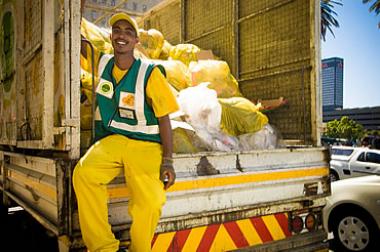Cape Town Residents and Business urged to help clamp down on illegal dumping
 CCID rolls out annual drain cleaning and maintenance programme
CCID rolls out annual drain cleaning and maintenance programme
According to the City of Cape Town about R200 million will need to be spent annually to clean up rubbish that has been dumped illegally across the city.
In the CBD itself approximately half a ton of illegal waste is collected by the CCID (Central City Improvement District) each month. Hotspots for illegal dumping within the Central City have been identified as Long, Loop and Bree Streets and between Hans Strydom Avenue and Buitensingel Street.
In addition to the costs, illegal dumping of waste has severe practical consequences for the CBD, which include clogged drains, the attraction of rodents, cockroaches and health hazards. These are proactively tackled by the CCID through its ongoing waste removal services and annual drain cleaning and maintenance programme.
From an enforcement perspective, the CCID, along with The City of Cape Town, J&M Cleaning Services and Straatwerk, a non-governmental agency, are working tirelessly to clamp down on illegal dumping to keep the public spaces of the Central City attractive and safe for those who live and work in the CBD as well as to visitors, and investors.
“To minimise the environmental and health issues within the Cape Town CBD, we have increased our vigilance in identifying illegal dumpers and will take action against them, whilst working with the City to uphold its litter by-laws. Over the past two months we have already issued R44 000.00 worth of fines for illegal dumping,” says Tasso Evangelinos, Chief Operations Officer of CCID.
“On average the CCID cleansing and maintenance staff manages to rid the city of 60 tons of waste a month, which they then transport to the recycling depot in Philippi. “
“In 2011 alone, this team managed to remove more than 1500 tons of waste from the Central City, this included 4.7 tons of waste cleared from 4100 channels and 22 tons of waste removed from 2700 fresh water drains. The removal of this waste is essential in keeping the drains and channels unblocked and rodent free, and is over and above that collected by City services,” says Evangelinos.
Evangelinos adds that it is important for residents and business owners to take better care of their environments by ensuring that they dump their waste legally and appropriately. “We need residents and business owners to help us keep the CBD clean by disposing of their waste through the proper channels. World class cities are clean cities.”
The CCID says that simple steps can be taken by residents and business owners to dispose of their waste legally and appropriately:
Contain it
The City of Cape Town collects residential waste within the central city, from the green and black bins once a week during weekdays according to a scheduled programme. Residents are to place their waste containers outside their homes preferably no later than 06:00 in order to prevent waste pile up.
Drop it off
The public can make use of the nearest community drop-off facilities where they can drop off excess waste and recyclables for free. Note that residents are restricted as to the amount of waste they may drop off. For details on volumes of waste accepted at specific sites, and frequency thereof, please consult the drop-off table by following the link below.
www.capetown.gov.za/en/Solidwaste2/Documents/Dropoff_table_Revised_August_2011_2.pdf
Service delivered
Retailers, corporates and other businesses not yet doing so must make arrangements for waste collection either by signing a service level agreement with the City or employing a private collection company. This will help plan and prevent having to put waste outside a few days ahead.
The City’s By-Law states that businesses must have sufficient bins to contain all their waste until collection day. If a business is unable to provide sufficient storage space for the required number of bins, it should make arrangements to increase the frequency of refuse collection, enabling it to get by on fewer bins.
No food zone
“With regards to the rodent issue in particular, other measures that can be taken to ensure that rodents do not thrive in the CBD are that business owners, especially those of restaurants and food outlets, should make sure that their waste is removed regularly and that their refuse holding areas are kept clean and free of food particles and other edible waste matter,” says Evangelinos.
As a part of its overall urban management strategy, the CCID will be rolling out its annual drain cleansing and maintenance programme this month. The team has already cleaned 715 gulley drains in the last two months,” continues Evangelinos.
“Illegal dumping is a serious offence and the consequences affect everyone living, and working in the CBD,” says Evangelinos
Residents and businesses can visit www.capetown.gov.za/en/Solidwaste2/Pages/default.aspx for more tips and techniques on how to manage their waste.
















